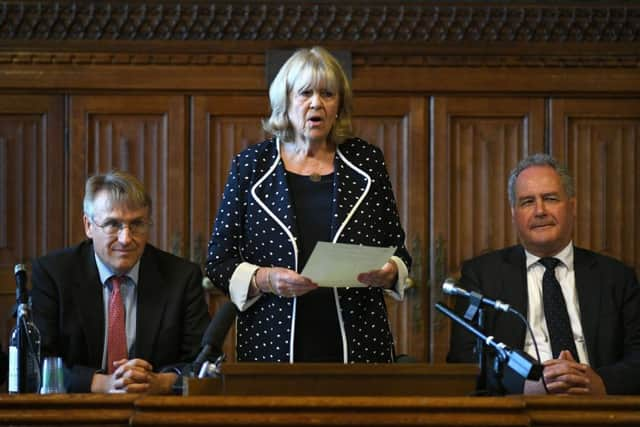Tory leadership is ‘ultimate job interview’ and candidates must now rise to challenge – Justine Greening


But it is an unedifying spectacle – it really doesn’t get any more thrilling – and I’m often asked what actually happens on the ground as the leadership contest plays out?
Advertisement
Hide AdAdvertisement
Hide AdEssentially, the House of Commons becomes a place where – for leadership candidates – it’s all about the zero-sum game of bagging as many MP supporters as they can.


Once an MP has declared for someone in the next round of voting, they’re lost to all the others. The candidates have generally assembled a core team around them who reach out to other MPs to sound them out.
Advertisement
Hide AdAdvertisement
Hide AdAnd it has a touch of Planet Earth, as the big beasts and their teams forage in the political undergrowth to uncover as many MPs that will back them. For MPs who are used to canvassing voters on the doorstep, this is the time they themselves are on the receiving end of being asked for their vote.
Momentum matters too because achieving – and maintaining – it is a political skill in itself that is the sign of a capable candidate for Prime Minister.
And what we are all engaged in is, in effect, the ultimate job interview. I’ve met with all the main candidates. They’ve faced some blunt questions from me, for example, on their Brexit strategy, future election strategy and how they feel we can successfully reach out to younger voters.
I’ve found their pitches can be very different with different styles. Some are more convincing and well put together than others. Pitches may be big on vision but low on detail. Other leadership candidates have come up with proposals that I found genuinely thought provoking, but not at all practically sensible as a proposal for Government.
Advertisement
Hide AdAdvertisement
Hide AdSpeaking to the candidates face to face, seeing how they respond to questions and challenges, is really the only way to work through who’s serious and who’s not. I’ve told all the candidates that I’ll not be publicly or privately supporting anyone. None of them have fully confronted how we can resolve Brexit which, in all of this, remains the elephant in the room.
These meetings also give me a chance to set out what I want to see from them in terms of national priorities. I can ask how they’ll approach issues that especially matter to my own community such as housing, environment or Heathrow noise pollution. And, inevitably, in all cases I’ve wanted to discuss their views and proposals on how we drive opportunity and social mobility. But, as the discussions take place, it’s hard not to feel that this contest feels a million miles away from the communities and people across the country. In the end success will be defined by whether or not the next Prime Minister can deliver on the ground for us, wherever you live.
Setting aside the differences we have on Brexit, it’s crucial that the wider agenda our party has is one that can work for our country as a whole. I want a programme for government that can turbocharge opportunity across the whole country – not only for the London community I represent in Putney but for my home roots in Yorkshire.
And, ultimately, leadership contests always need to reach a conclusion. So they may start the same way - but they always finish the same way, too. Excitement gives way to fear, and for many MPs a growing sense of personal panic. Backing a losing horse is a dangerous Game of Thrones-style situation for many MPs this weekend. For the candidates themselves, they too must inevitably work out their support, or lack of it. This weekend for the laggards there is a careful calculation to be made. Will staying in see you gain more support or do you withdraw gracefully so that you don’t at least run the risk of seeing your supporters humiliatingly leeching away? There can be only one winner, but it’s not straightforward for the losers either. Some emerge from the contest enhanced in the Party’s eyes, whilst others will confirm the suspicions their colleagues had that they were never that popular in the first place. All political ego trips have to come to an end eventually.
Advertisement
Hide AdAdvertisement
Hide AdWhatever the outcome, the next Prime Minister faces a formidable challenge in resolving a path forward on Brexit, in a Parliament in which they run a minority Government. Theresa May was dealt an impossible hand and then played it badly. Her successor and their Cabinet should learn from those mistakes, not repeat them. They also need to deliver a domestic agenda for change in spite of what can be an all-encompassing Brexit project. Have I seen anyone I think can succeed? Perhaps. Will they win? Maybe. Only time will tell.
Justine Greening is the former Education Secretary. Born in Rotherham, she is a Tory MP.
Fixing the Treasury is key to social mobility agenda
JUSTINE Greening delivered a hard-hitting speech in Parliament this week calling for Treasury reform to boost social mobility.
She said: “If we really want Britain to be the first country to achieve equality of opportunity, a significant part of that solution starts right at the heart of Government, by fixing the dysfunctional Treasury.
Advertisement
Hide AdAdvertisement
Hide Ad“Unless we grasp that nettle, we should not be surprised to get the same day-to-day cash flow management that prioritises political pet projects, sets No. 10 and No. 11 Downing Street at loggerheads with each other, which is dysfunctional for the nation, and, in the end, achieves the exact opposite of what we all want — for our children, young people and communities to have equality of opportunity, access to opportunity on their doorstep and the chance to be the best version of themselves. That unlocks the chance for our country to be the best version of Britain, too.”